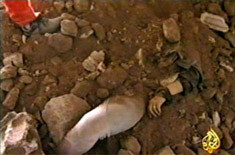Electronic Lebanon 31 July 2006

Screen Image: Al-Manar

Screen Image: Al-Jazeera
In the early morning hours of 29 June 2006, the Israeli military ordered a massive bombardment of Qana, a village in southern Lebanon. A few days earlier, the military had dropped leaflets from the air, warning that the entire area was a potential military target. At the same time, the Israeli military continued its ongoing destruction of roads and other civilian infrastructure such as petrol stations and continued to target certain vehicles (for example, minivans and pick-up trucks). For those few who were in possession of transport and fuel, it was an almost impossible choice: flee and risk being killed on the road or stay behind and risk being killed in their homes.
For dozens of civilians, mostly women and children, who stayed behind in Qana, their homes became their graves as high calibre rockets and missiles levelled the apartment buildings they were sheltering in.
Under international law, and in particular the Hague and Geneva Conventions, the Israeli army must be restrained in how it responds to attacks on Israeli territory, including the types of weapons it uses. It must refrain from directly attacking civilians and engaging in indiscriminate attacks; and it must not needlessly destroy civilian infrastructure.
Furthermore, Israel, by occupying parts of southern Lebanon, has additional duties, in particular to ensure that civilians are protected and have access to humanitarian assistance and that the sick and wounded have access to medical assistance.
After what appears to be a deliberate and disproportionate attack on a village known to be heavily occupied by civilians who were unable to escape, it is imperative that an investigation be immediately undertaken at to whether Israel has committed war crimes. If this is found to be so, the individuals concerned must be held accountable.
The international community cannot continue to stand on the sidelines as Israel flagrantly violates international law and massacres civilians in their own homes. The United Nations, European Union and United States have a duty to hold Israel accountable, for example by way of sanctions, including an arms embargo, and insist upon an immediate and unconditional ceasefire.
Jeff Handmaker is an human rights lawyer and part-time attached to the Netherlands Institute of Human Rights (SIM), Utrecht University as a PhD candidate. Dr. Avril McDonald is head of the section of International Humanitarian Law and International Criminal Law at the TMC Asser Institute for International Law, The Hague.
Related Links





